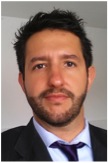Studying at the University of Verona
Academic calendar
The academic calendar shows the deadlines and scheduled events that are relevant to students, teaching and technical-administrative staff of the University. Public holidays and University closures are also indicated. The academic year normally begins on 1 October each year and ends on 30 September of the following year.
Course calendar
The Academic Calendar sets out the degree programme lecture and exam timetables, as well as the relevant university closure dates..
| Period | From | To |
|---|---|---|
| MED ING annuale | Oct 2, 2024 | Sep 30, 2025 |
| MED ING 1° semestre | Oct 2, 2024 | Dec 20, 2024 |
| MED ING 2° semestre | Jan 2, 2025 | Sep 30, 2025 |
| Period | From | To |
|---|---|---|
| Tutti i Santi | Nov 1, 2024 | Nov 1, 2024 |
Exam calendar
To view all the exam sessions available, please use the Exam dashboard on ESSE3. If you forgot your login details or have problems logging in, please contact the relevant IT HelpDesk, or check the login details recovery web page.
Should you have any doubts or questions, please check the Enrollment FAQs
Academic staff
Study Plan
The Study Plan includes all modules, teaching and learning activities that each student will need to undertake during their time at the University.
Please select your Study Plan based on your enrollment year.
1° Year
| Modules | Credits | TAF | SSD |
|---|
2° Year It will be activated in the A.Y. 2025/2026
| Modules | Credits | TAF | SSD |
|---|
3° Year It will be activated in the A.Y. 2026/2027
| Modules | Credits | TAF | SSD |
|---|
4° Year It will be activated in the A.Y. 2027/2028
| Modules | Credits | TAF | SSD |
|---|
5° Year It will be activated in the A.Y. 2028/2029
| Modules | Credits | TAF | SSD |
|---|
6° Year It will be activated in the A.Y. 2029/2030
| Modules | Credits | TAF | SSD |
|---|
| Modules | Credits | TAF | SSD |
|---|
| Modules | Credits | TAF | SSD |
|---|
| Modules | Credits | TAF | SSD |
|---|
| Modules | Credits | TAF | SSD |
|---|
| Modules | Credits | TAF | SSD |
|---|
| Modules | Credits | TAF | SSD |
|---|
Legend | Type of training activity (TTA)
TAF (Type of Educational Activity) All courses and activities are classified into different types of educational activities, indicated by a letter.
Systematic Pathology 1 (It will be activated in the A.Y. 2027/2028)
Teaching code
4S012578
Credits
23
Scientific Disciplinary Sector (SSD)
-
Learning objectives
Medical students will be able to grasp basic knowledge related to epidemiology, classification, pathophysiology, methodologic and diagnostic histopathology and clinical approaches, impact of treatment on natural history of main hematologic, rheumatologic, allergic, gastroenterologic, infectious and cutaneous disorders.
Pathologic Anatomy I MODULE
Learning objectives of the module are: know how to recognize and describe major pigmented and nonpigmented lesions of the skin; know how to recognize and describe major neoplastic and inflammatory changes of the large intestine and stomach; know how to recognize and describe lympho-proliferative changes (lymphomas); know how to recognize and describe lymphadenopaties (granulomatous, non-granulomatous); know the classification of neoplastic grading and staging by applying it, as an example, to adenocarcinoma of the prostate, urothelial disease, and neoplasm of the kidney.
Gastroenterology MODULE
Formative objectives of the module are: to know, in their pathophysiological and nosologic aspects, the main and epidemiologically relevant gastroenterological diseases; to know how to value the anamnestic and objective elements characteristic of the different gastroenterological diseases; to know how to set up the differential diagnostic procedure in relation to laboratory and instrumental examinations; to know the therapeutic directions of dietary, pharmacological and surgical nature for the treatment of gastroenterological diseases.
Rheumatology MODULE
Formative objectives of the module are: To know the anatomo-functional basis of joint and musculoskeletal structures; to know structure and physiology of connective tissues, bone tissue, and synovial fluid; to acquire the ability to implement elementary rheumatologic objectivity through analysis of distinctive signs and symptoms; know the laboratory investigations useful in rheumatology; know the classification of rheumatic diseases; know the epidemiology, pathophysiology, clinical symptomatology, and diagnostic guidelines of the most frequent rheumatic diseases; know the pathophysiological basis on which the therapeutic lines of the main rheumatic diseases are set.
Infectious diseases MODULE
The course aims to develop skills in the field of infectious and tropical diseases, including targeted history taking, clinical examination, and the use of microbiological and machine learning techniques for the early identification of patients at higher risk of complications. It aims to interpret microbiological reports and adopt evidence-based therapies, assessing the risk of complications. The development of therapeutic protocols for chronic viral diseases, the rapid identification of infectious syndromes, and the adoption of appropriate antimicrobial therapies are also anticipated. Preventive measures and principles of antimicrobial stewardship are included, with the integration of artificial intelligence to improve prescription and monitor the side effects of antimicrobial drugs.
Dermatology and Venereology MODULE
The module focuses on the clinical approach to dermatological and venereological pathologies, teaching dermatological clinical methodology, including medical history and physical examination of the skin. Students will learn the pathogenesis, clinical presentation, diagnosis, and therapeutic principles of the most common skin diseases, both dermatological and venereal, and skin conditions associated with systemic diseases. By the end of the course, students will be able to conduct a comprehensive medical history and physical examination of the skin, integrating collected information to formulate diagnostic hypotheses and initiate treatments. They will also be able to evaluate the dermatological clinical picture in relation to the patient's overall condition through a multidisciplinary approach.
Hematology MODULE
The module aims to provide the fundamental guidelines for understanding the pathophysiological bases and the diagnostic approach of hematological diseases, to transmit to the student the theoretical and methodological cornerstones on which doctor's judgments and decisions are based. Therefore, the training objectives of the module are: i. to acquire a general medical-biological culture allowing to assimilate new knowledge and new experiences; ii. to enable the general practitioner to diagnose and treat hematologic diseases.
Practical Teaching of Dermatology, Gastroenterology, Hematology, Infectious Diseases, Rheumatology, and Tutorial Problem Based Learning
The training objectives of the module with regard to the field of dermatology are: To know how to carry out a correct history and objective skin examination; to acquire the ability to make an integration between all the information gathered through the history, objective examination, and clinical & instrumental investigations in order to arrive at a plausible interpretation of the clinical picture and the formulation of a diagnostic hypothesis; to be able to independently set up a therapeutic treatment; to be able to evaluate and integrate the characteristics of the dermatological clinical picture with the general state of the patient through a multidisciplinary approach.
The training objectives of the module with regard to the gastroenterological field are: to know how to detect the main clinical manifestations of digestive diseases; to understand the methods of performing investigations designed to detect, through technologies proper and specific to gastroenterology (endoscopy, digestive pathophysiology, digestive ultrasonography, eco-endoscopy), the morphological and functional elements of diseases of the digestive tract, and to know how to implement integration with clinical aspects; to know the main therapeutic procedures towards the main diseases of the digestive tract and the biliary-pancreatic tract; to understand the value of ward, day service and outpatient clinical activities, and the multiplicity of approaches to the patient with digestive pathology in different settings.
The formative objectives of the module with regard to the hematologic field are: to know how to evaluate the laboratory results, signs and symptoms of major hematologic diseases; to know how to recognize or suspect, by initiating the patient promptly to the specialist, hematologic diseases that are beyond the generalist's ability to intervene; and to know how to collect a history oriented to the hematologic field.
The training objectives of the module with regard to the infectious field are: to know how to make a diagnosis of infectious disease through the correct collection of a focused history and the evaluation of microbiological and laboratory test results; to understand the correct way of performing the spinal tap, thoracentesis, and paracentesis; to interpret reports regarding blood cultures, stood and urine cultures, antibiogram, hepatitis B virus markers, western blot for HCV and HIV, and CSF examination.
The training objectives of the module as far as rheumatology is concerned are: to know how to perform a history oriented to rheumatological problems; to know how to identify risk factors that expose to the onset of rheumatic diseases; to be able to interpret the results of laboratory tests in order to make a diagnosis of rheumatological pathology; to know how to perform simple semeiology for the identification of dysfunctionality from rheumatic pathology.
The ""Problem Based Learning"" methodology, based on the discussion of clinical cases in the context of a small group of students led by a tutor, has as its general training objectives, in addition to the specific learning objectives related to individual clinical cases, that of developing interpersonal and behavioral skills.
Examination Methods
Oral examination on pathophysiology and diagnostic approach to diseases included in the different teaching modules
Evaluation criteria
The oral exam assesses the level of knowledge of the theoretical contents, language skills in presenting the pathophysiological and diagnostic aspects, the logical/deductive and synthesis skills, and argumentation skills. The exam is considered positive for scores equal to/greater than 18/30
Free choice courses
Modules not yet included
Career prospects
Module/Programme news
News for students
There you will find information, resources and services useful during your time at the University (Student’s exam record, your study plan on ESSE3, Distance Learning courses, university email account, office forms, administrative procedures, etc.). You can log into MyUnivr with your GIA login details: only in this way will you be able to receive notification of all the notices from your teachers and your secretariat via email and soon also via the Univr app.

 giuseppe.bertini@univr.it
giuseppe.bertini@univr.it
 045-802-7682
045-802-7682








